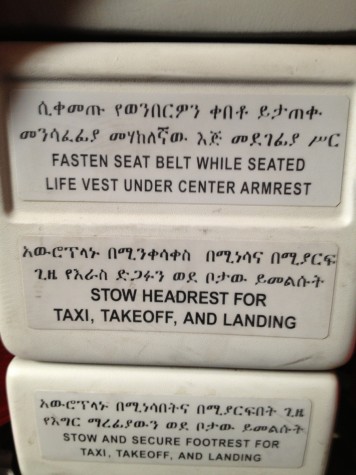
We truly had no idea what to expect when we arrived.
We certainly didn’t expect to arrive in what was, to my eyes, Cairo twenty years ago. The airport lighting was that old-fluorescent dim. The springs in the seat of our taxi were sprung just exactly like all the taxi seats I’d known in Cairo in 1992, so that they felt a bit molest-y, but also sad. The air even smelled the same: dusty, smoggy, desert-like, even in the cold.
After we arrived at our hotel, we took a quick spin through the surrounding blocks. It was Christmas day (Ethiopian Calendar), and while that had meant near silence at the airport, around our hotel, it meant the streets thronged with drunken party people.
Mere steps outside of the hotel gate, we were accosted by a gang of four dudes who claimed to be students, and who at various points claimed not to know one another, and then yes, know some of the other guys, and then that they just wanted to have a drink and talk because it was Christmas.
This too reminded me of Cairo twenty years ago–not because Cairo no longer has charming street hustlers who want to chat you up, but because I haven’t been particularly bothered by them in twenty years.
When I wrote the Cairo chapter of the Lonely Planet Egypt guide in 2007, I took it as my chance to pour out all my love for Cairo onto the page. To help the first-time visitor take a short-cut to loving the place the way I did, maybe in a few days, instead of a few months (or never, as happens with the majority of tourists). Don’t worry, I said, basically–just relax and enjoy the chaos. People are basically nice–don’t lose sight of that.
But going to Addis was a good reminder–some might say, ah, a reality check for the blithe travel writer–of just how overwhelming a whole new rough-and-tumble city can be, one where you are very, very obviously a tourist.
I couldn’t read the signs. I couldn’t understand the language. I didn’t yet know where I was on a map, and it was dark, and half-dressed street people were sleeping in the shadows, and I didn’t know how much a beer cost, and hadn’t had time to inspect the money (only enough to notice that the bills all smell like Ethiopian food, from being passed from spicy-buttered hand to spicy-buttered hand). I was out of my depth in a way I had not been in a very, very long time. I couldn’t even blame jet lag, because we’d just flown a few hours, from Kigali.
I knew these faux-students were probably no more than a nuisance, but I could not see past my own discomfort to see how it might be informative and interesting to talk to them anyway–as I had cheerfully advised people to do in the Egypt guide. We bought the guys one round of beers (in a bar strewn with hay, to mark the festive Christmas day), and stomped back to the hotel in a mild, exhausted huff.
Daylight was better. Then I could get my bearings a bit. The corner where we’d gotten press-ganged the night before was now the site of different traffic.
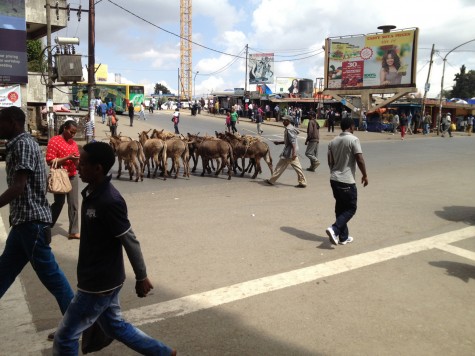
I could walk slowly, and look at architectural details–Greek- and Armenian-style architecture in the blocks around our hotel.
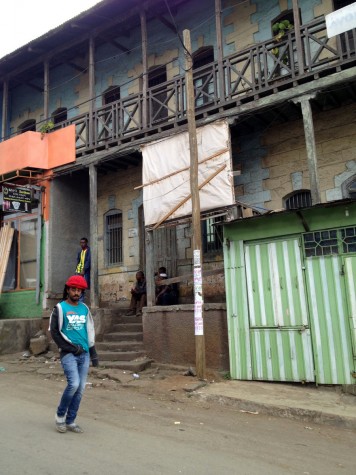
And soon I was noticing even smaller, stranger details. Like the propensity for all the male mannequins to be so…bulging.
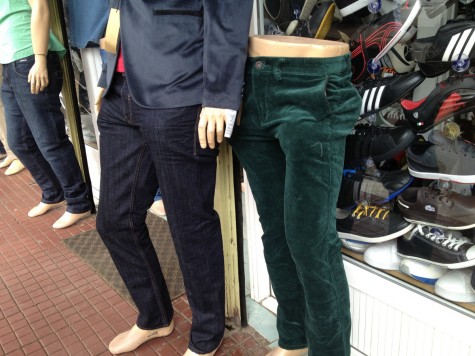
In a few more hours, I felt my equilibrium somewhat restored. It wasn’t that the sketchy aspects of Addis had gone. Plenty of people stared, and followed, and a street kid yoinked Rod’s cell phone (but he got it back).
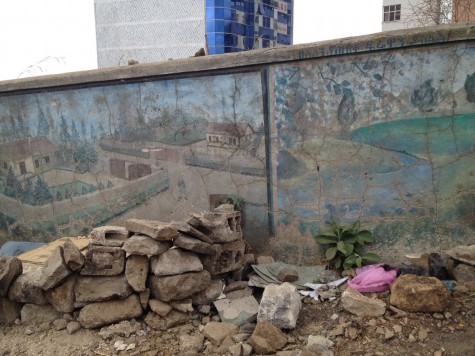
I found myself wondering about Cairo. When I was there in 2011, it seemed cleaner than I remembered, not so filled with beggars, and the hassle is somewhat less. But how much of that was due just to my perception? To my learned ability to screen out the worst, while also seeing (and knowing) the best in Cairenes? That’s what getting comfortable in any new place requires.
We were only in Addis a few days, but even in that short time, I was able to agree with what our guidebook (Bradt) said about the city: “Its bark is worse than its bite,” the author assured us. Which is a gracious way of saying, “Just relax and enjoy the chaos.”
Thus endeth the lesson. A few more photos:
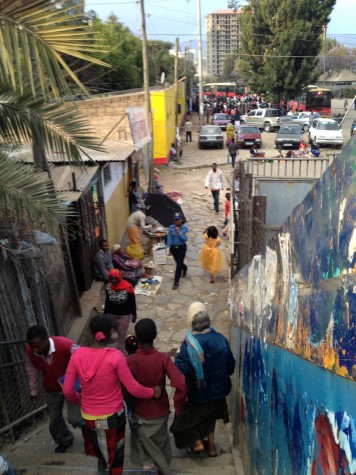
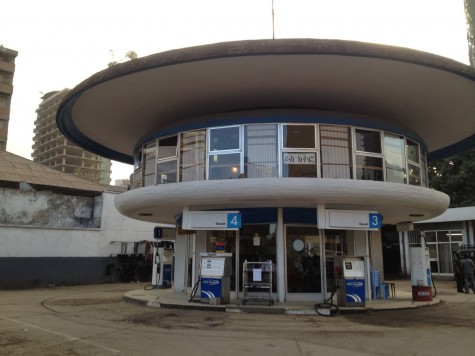
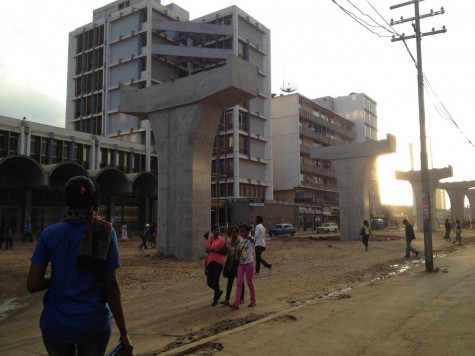
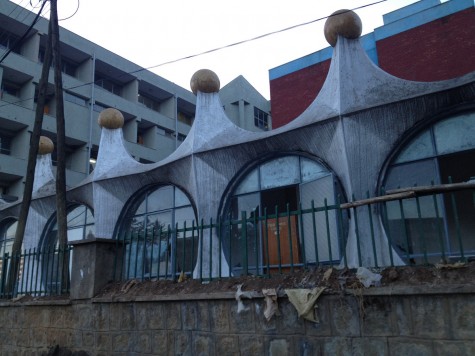
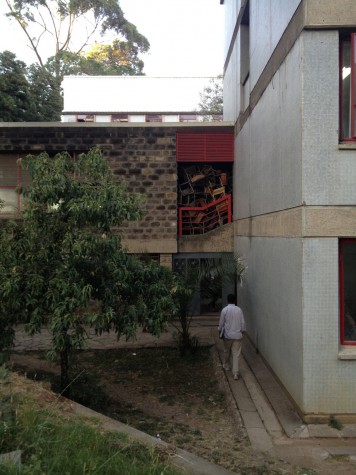
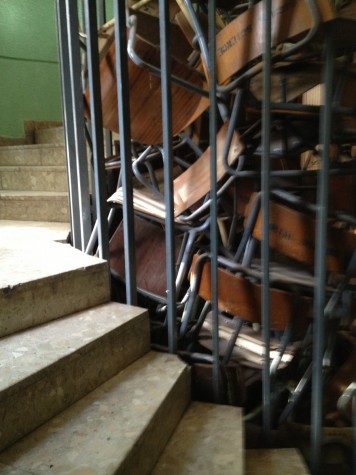

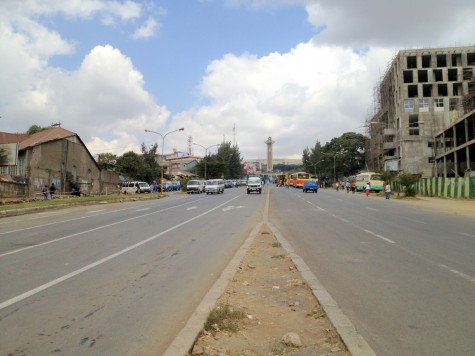
Foooood! Where’s the food?
N0t to worry, it’s coming! Next week. (And, weirdly, it’s also Ethiopian! Who who’d have guessed?)